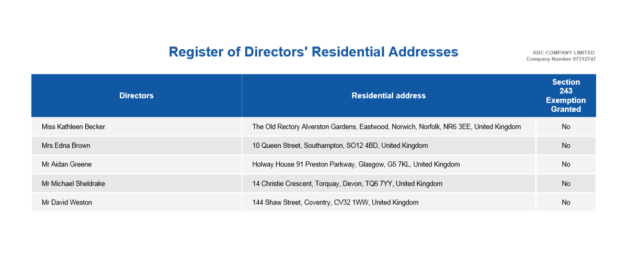When setting up a limited company, directors and certain others must provide their ‘usual residential address’ to Companies House as part of the application. In this article, we look at a company’s responsibilities, what addresses can be used and how they remain private.
As the name suggests, it is the home address at which they (usually) live.
The person’s residential address is different from other addresses which must also be provided to Companies House, including:
- The company’s registered office address
- The service address of an officer or person with significant control (PSC)
Want to make it much easier to manage your UK company?
An important part of managing a UK company is keeping its statutory books and filings up to date. Inform Direct is the perfect tool to help make this task a whole lot easier.
An individual’s residential address may also be used as their service address and even for the company’s registered office address, although many avoid that for reasons of confidentiality.
Unlike the company’s registered office address, the residential address does not have to be a UK address – it can be wherever in the world the person resides. Because it has to be where they live, the residential address supplied can’t be a business address, and if a commercial address is provided it will usually be spotted and the whole submission rejected by Companies House.
Who needs to provide a residential address to Companies House?
A residential address must be submitted to the regulator when any of the following are appointed:
- An individual company director
- An individual person with significant control (PSC)
- An individual LLP member
A residential address for these people must be provided, whether they are appointed to the company when it is first formed or at a later date.
Directors, PSCs and LLP members which are corporate entities do not provide a residential address. Neither does a company secretary or shareholder, even if they are an individual person.
Does a director’s residential address appear on the public register?
Most information submitted to Companies House is displayed on the public register, visible to any member of the public online, and until October 2009 that included each director’s residential address.
According to the UK government, the visibility of residential addresses meant company directors were roughly twice as likely to be victims of identity fraud compared to non-directors, so updated measures were introduced as part of the Companies Act 2006.
From October 2009, therefore, directors have had to provide a service address to Companies House alongside their residential address. It is now the service address, also used by the registrar and other government bodies to contact the director, which is instead displayed on the public register and therefore visible to the general public.
A director’s residential address is not visible to the public. However, because the company’s registered office address and the director’s service address do appear on the public register, if you’re concerned about privacy you shouldn’t use your residential address for either of these. If you don’t have access to an address other than your residential address, you might consider purchasing a business address service in order to preserve your privacy.
While a new director’s residential address is not shown on the public register, it is still shared with:
- Specified public authorities (SPAs) – for example the police, HMRC and other government bodies which may use the information as part of their activities; and
- Credit reference agencies (CRAs) – that assess an individual’s creditworthiness, which for a director can influence their company’s access to lending from banks and other financial institutions.
Further protection of a director or PSC’s residential address
An individual can make an application to Companies House to prevent their residential address being disclosed to credit reference agencies. The relevant provisions for directors in Section 243 of the Companies Act 2006 have been supplemented by Section 790ZF for PSCs.
The individual making the application must have reason to believe there is a serious risk that they, or someone who lives at the same address, will potentially be subject to intimidation or violence.
An application might be appropriate for:
- A director or PSC of a company which is licensed under the Animal (Scientific Procedures) Act 1986) – so where the threat is from animal rights activists;
- A director or PSC of a company whose business is in the defence industry;
- A director or PSC of a company which has detectible links to a business in one of the above categories. For example, they may provide supplies or partner with such an organisation;
- A director or PSC of a company which has been targeted by activists;
- There are similar provisions for a director or PSC who is subject to witness protection.
The Companies (Disclosure of Address) Regulations 2009, as amended, describe the requirements to restrict access to an individual’s residential address in this way. In a request made to Companies House, any evidence of police involvement (including a police incident number) alongside other relevant details will help to support an application for confidentiality.
Companies House provide a more detailed guide to residential address protection. Their protection team are available for enquiries via 02920 348354 or by email at [email protected].
Even with this added protection, the individual’s residential address will still be made available to specified public bodies.
Historic residential addresses on the public register
Although the current regime ensures residential addresses remain out of public view, Companies House was not required to remove directors’ residential addresses which were previously disclosed on the public register, including all those available before 1 October 2009.
From 26 April 2018, however, a director can make an application to Companies House to remove their residential address for any period – including prior to 1 October 2009 – from being visible to the public. There is a fee per document in which the residential appears requiring removing from public inspection, and an alternative address must be provided if the individual is still appointed to the company. For historic appointments, there is no need to provide an alternative address.
It’s not possible for a residential address to be removed where it has been used as the company’s registered office address.
Changing a residential address
When a director, PSC or LLP members moves house, the change in their usual residential address must be reported promptly to Companies House. Neither the old or the new address will be displayed on the public register.
The appropriate forms to use are:
- CH01 for directors of limited companies
- PSC04 for PSCs of limited companies
- LLCH01 for members of LLPs
- LLPSC04 for PSCs of LLPs
If the person has multiple roles within a company – for example, they are both a director and PSC – the appropriate form for each role needs to be submitted. If the individual is involved with multiple companies, separate forms will be required to update their residential address for each company.
The relevant paper forms can be posted to the registrar, but it is quicker and easier to file online via software like Inform Direct.
The register of directors’ residential addresses
Under the Companies Act 2006, a company is now required to maintain a Register of Directors’ Residential Addresses, which records each director’s residential address and any changes to it over time. It’s important that this and other company registers are kept up to date.
The Register of Directors’ Residential Addresses is separate from the Register of Directors, which contains other relevant details for each director like their service address, business occupation and nationality. Unlike the Register of Directors, the Register of Directors’ Residential Addresses does not need to be made available for inspection on request by members of the public.


